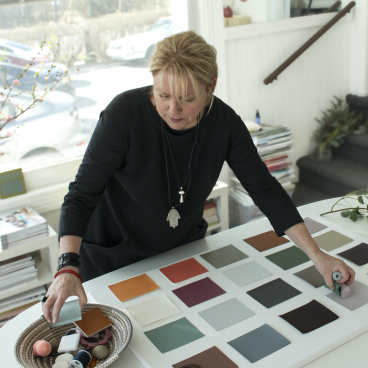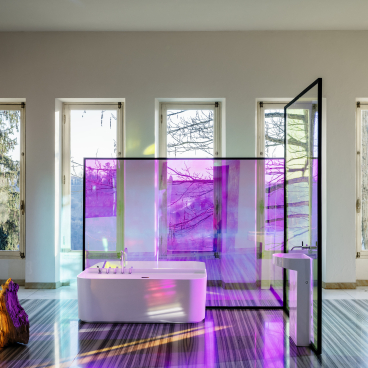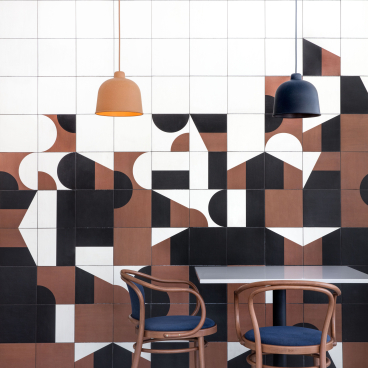74 creates sophisticated student amenity space for London and Scottish Student Housing.
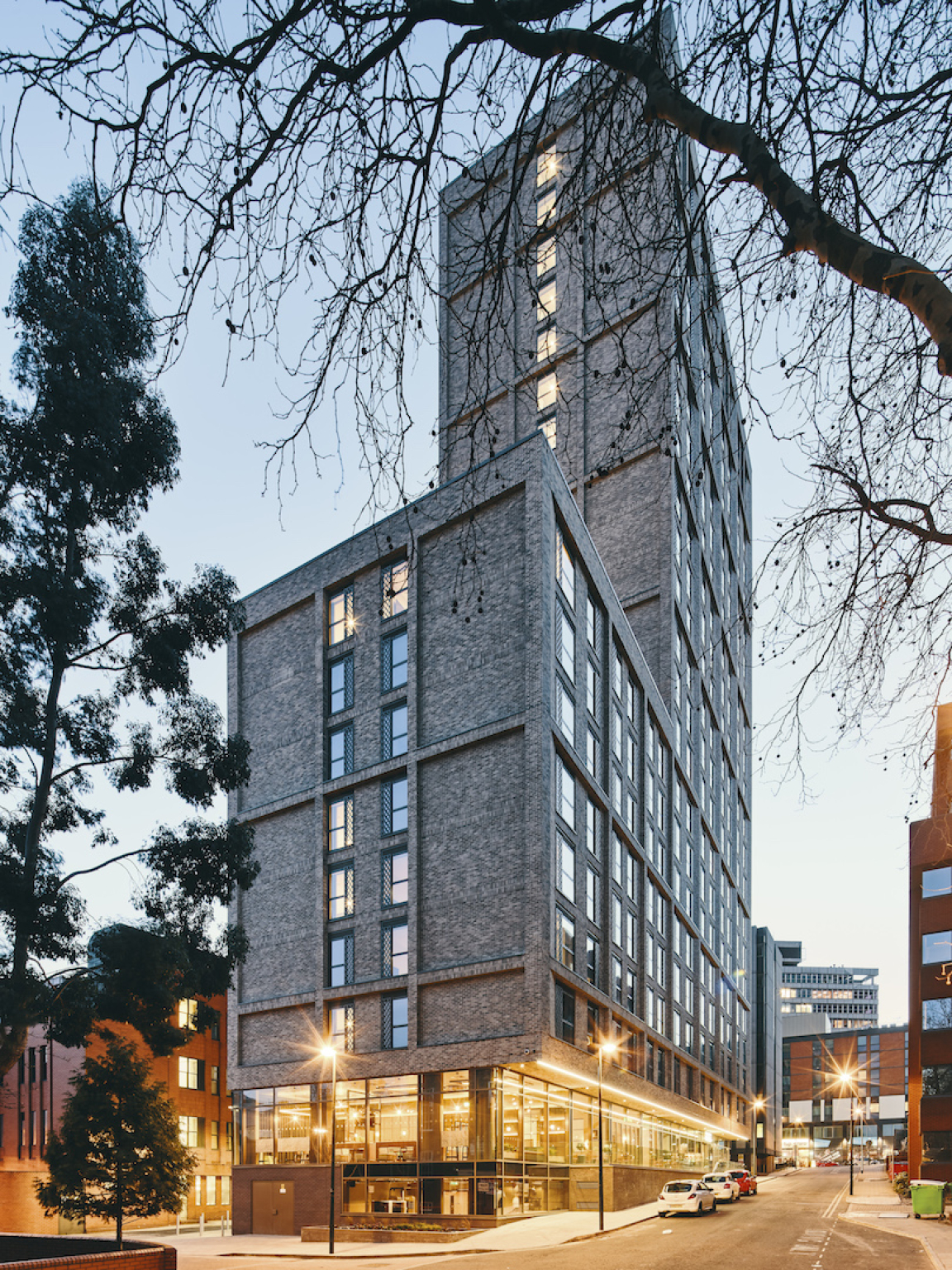
Symons House, Leeds. Photography by Gu Shi Yin
Multi-award-winning interiors and architecture practice 74 have completed a stand-out student amenities project for client London and Scottish Student Housing within their new-build Symons House student accommodation block in Leeds. 74 also created the project’s branding and wayfinding.
Architectural Inspiration
Symons House, designed by Leeds-based architectural practice Cunniff Design, takes the form of a reverse L-shape building, with seven storeys located on its lower horizontal plane and twenty-one on the vertical upright section. Both the building’s ground and lower-ground storeys, where the amenities spaces are located, stand out by being indented from the main building above and also by featuring glazed walls.
The interior design treatment for the amenity spaces took initial inspiration from the building’s architecture, where the materials palette references a recognisable local residential vernacular, with a broadly 1930s feel, including brushed brick with a pale-yellow tone and bronzed anodised aluminium window frames. The latter detail directly inspired, for example, the use of bronzed metal framework within the interior.
‘We worked with the building’s unusual angled glazed box base to make the most of views in and through the amenity space’ 74 Associate Bianca Yousef commented. ‘At one end of the building, the ground floor only can be seen, while, as the street slopes down, passers-by can also see into the lower-ground-floor gym space at the far end.’
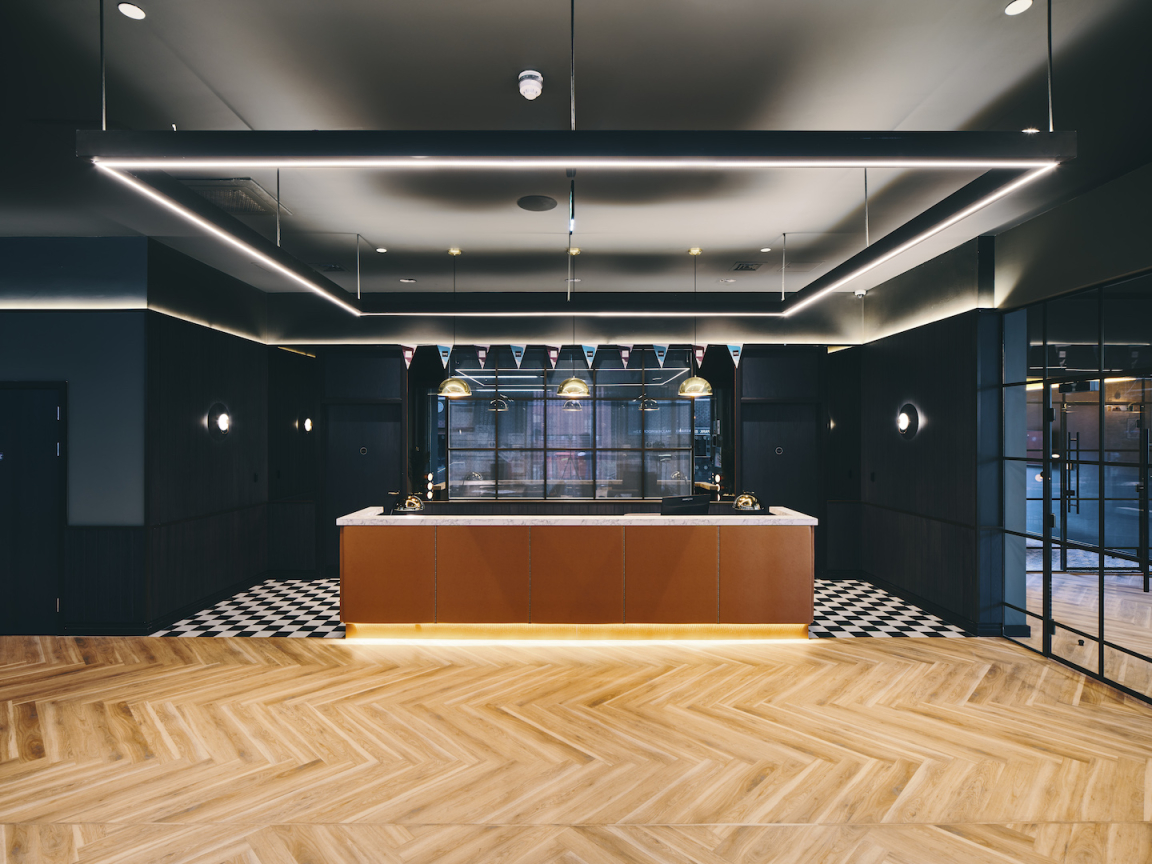
Symons House, Leeds - Reception. Photography by Gu Shi Yin
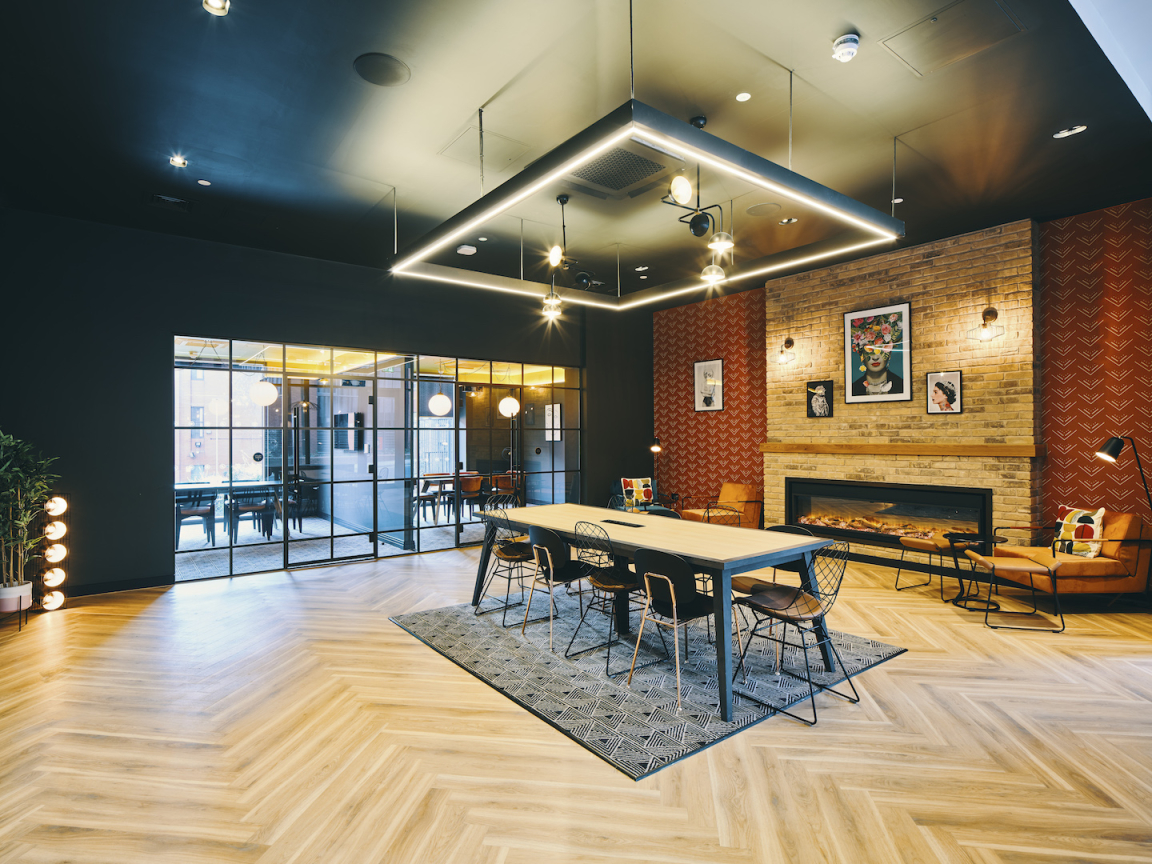
Symons House, Leeds - View into first two of the scheme's four private study rooms. Photography by Gu Shi Yin
Design Approach
The design of the amenity spaces represents a step-change away from the bright-and-cheerful approach that dominates the sector, where spaces are often saturated with primary colours. For the Manchester practice’s second scheme for London and Scottish Student Housing (following an earlier student amenity project, Crown House in Sheffield), the brief to 74 was to create a sophisticated and high-spec scheme with grown-up colours, great detailing, and a pronounced hotel/hospitality influence.
The full suite of amenity spaces includes a reception lobby, back-of-house space, study lounge, meeting rooms, library, communal kitchen, toilets, cinema room, gaming lounge, and gym, as well as an 8th-floor private dining room. The material treatment for the scheme includes bronze-finish crittal-style doors and glazing, which respond directly to the external metalwork, plus a double-dado rail treatment that further ties into the door and window levels. Large, rectangular lighting rafts in bronze-painted timber continue the metallic allusions.
The colour palette features neutral colours throughout with subtle, darker highlight areas in browns, greys, deep blues and olive greens. Flooring throughout is in Amtico herringbone timber, with highlight areas in black-and-white chequerboard tiling or featuring elegant carpet insets by Newhey. Planting is also incorporated throughout, though, in an unregimented way to ensure the space has a relaxing and non-corporate feel.
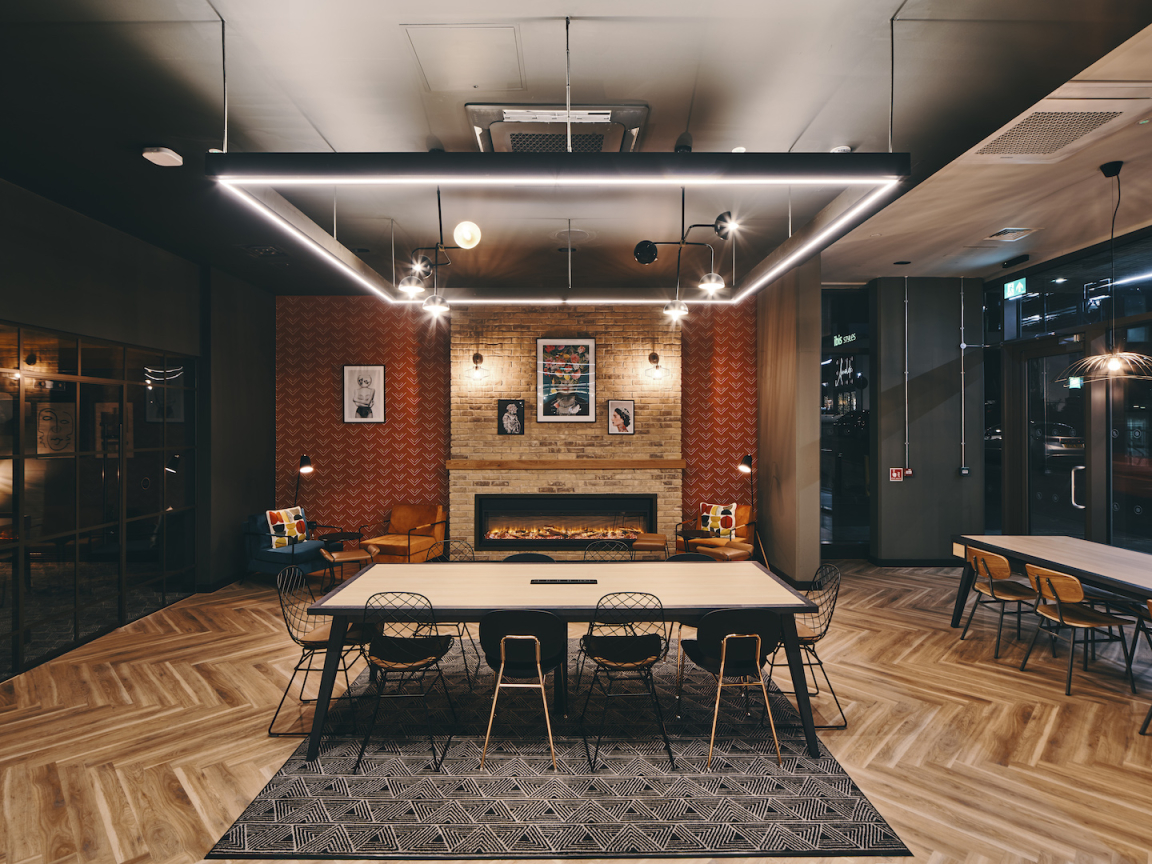
Symons House, Leeds - Study lounge. Photography by Gu Shi Yin
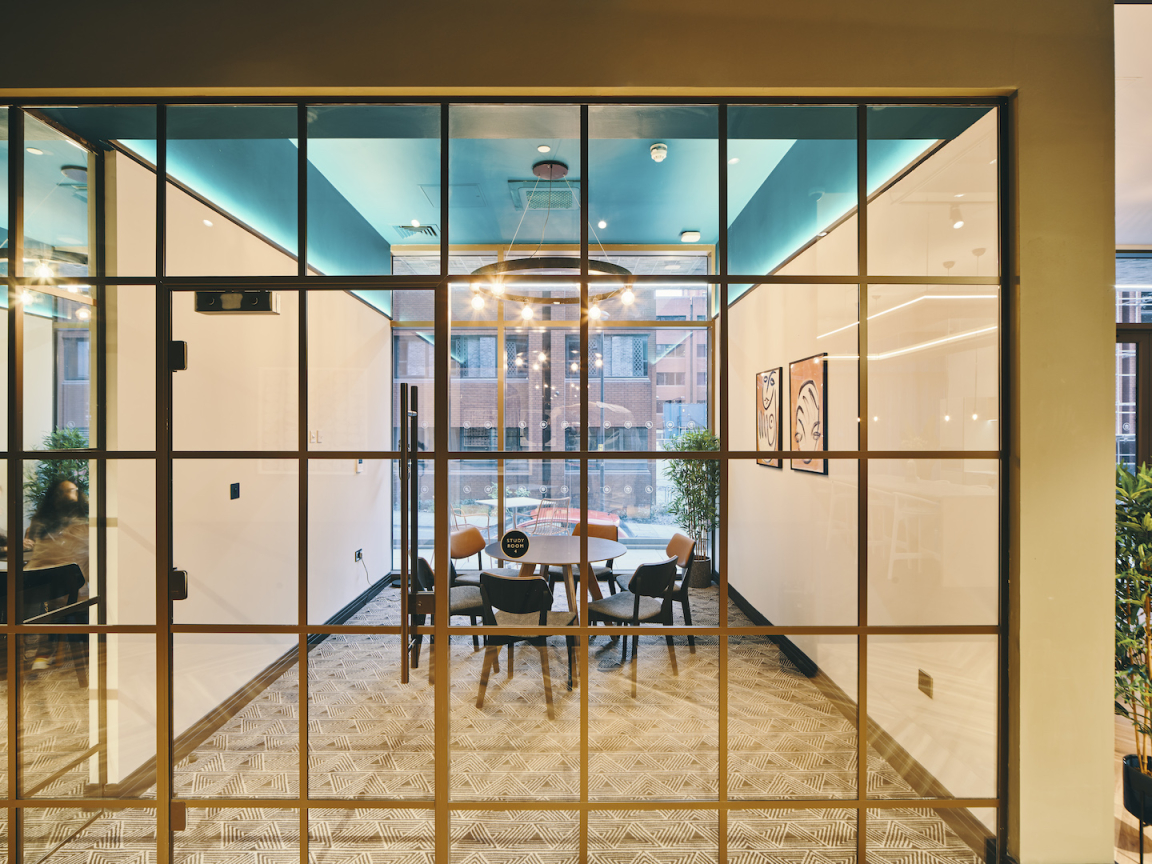
Symons House, Leeds - Crittal-style doors to study room. Photography by Gu Shi Yin
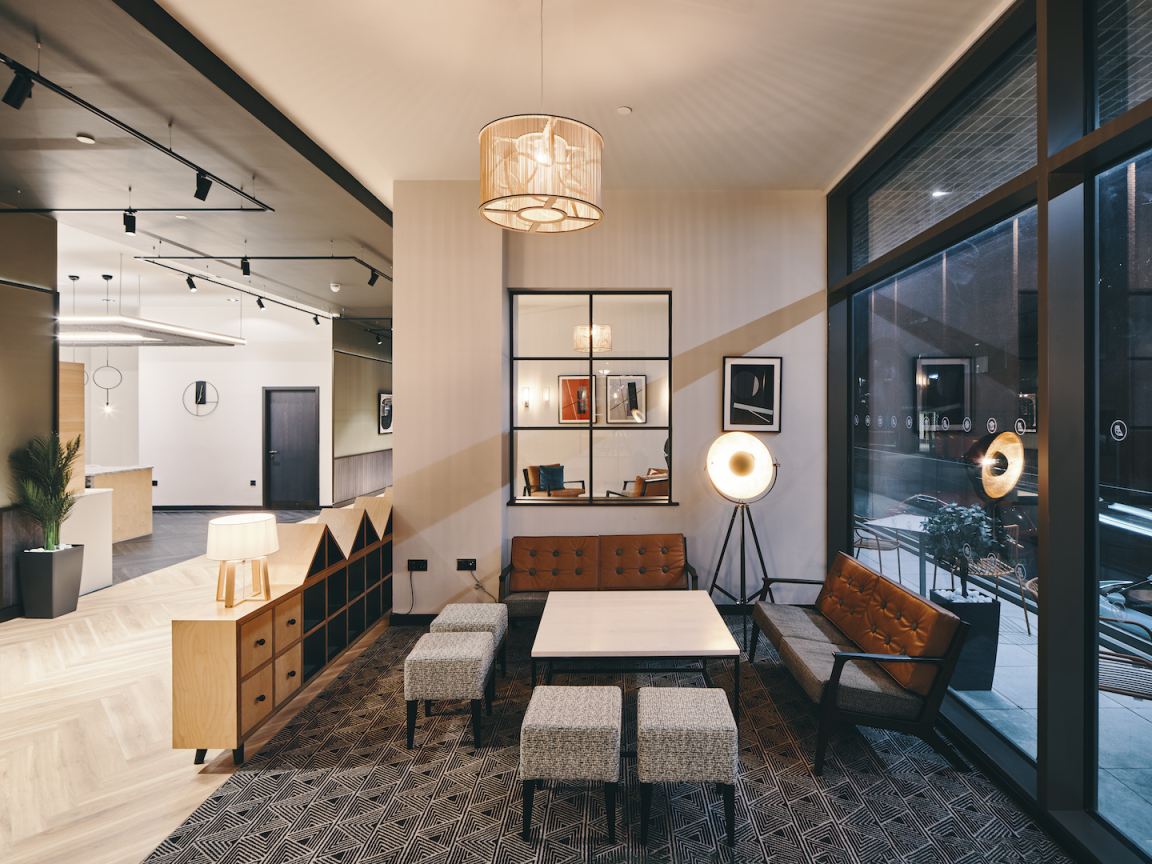
Symons House, Leeds - Second seating area in the library space. Photography by Gu Shi Yin
Amenity Spaces Design Walk-through
Entry into Symons House is up a series of ground-level steps and into a spacious lobby area, with an underlit reception desk directly ahead. The reverse-U-shaped desk itself is a standalone bespoke design, with a marble laminate top, a concealed shelf for staff use, and leather-look external binding, with studded vertical lines inspired by case goods and the golden era of travel.
The timber laminate arrival flooring gives way to chequered black and white vinyl to the sides and rear of the desk, while semi-opaque glazing at the rear conceals access to a back-of-house area. Wall panelling is in a stained dark brown and was created by the amenity’s fit-out contractor and joinery specialists Medlock, who manufactured all the bespoke timber elements in the project.
A version of a double dado rail also sits behind the reception at mid-height level and again just below the ceiling. This detail and the heights the rails are set at tie in with the levels of crittal doors, windows, and screens throughout. The upper rail level, by Orac also features inset LED uplighting. In the centre of the reception area ceiling is a large rectangular lighting raft in bronze-painted timber with a concealed LED strip.
The raft feature is repeated four times within the project and can also be seen in the study lounge and games lounge, as well as in the communal kitchen, where it features a unique, fabric-panel-wrapped design. Further feature lighting in the reception space includes wall lights, a series of three bronze-finish pendants over the desk, and two brass table lamps to either end of the desktop.
Turning right at reception takes users into the study lounge and the first two of a total of four study/meeting rooms. The study lounge features notably domestic references, including a brick slip fireplace with a real lit fire at its centre. Wallpaper to either side of the fireplace, by Newmor, features a downward-pointing arrows design.
Two long study tables in the space were designed by 74 and bespoke-made by Medlock, while all the loose furniture in the room, in burnt orange and teal upholstery, was supplied by Telegraph Furniture.Eclectic artwork, supplied by Indigo Art, completes the domestic feel. Contemporary chandeliers in the space were provided by Enigma Lighting.
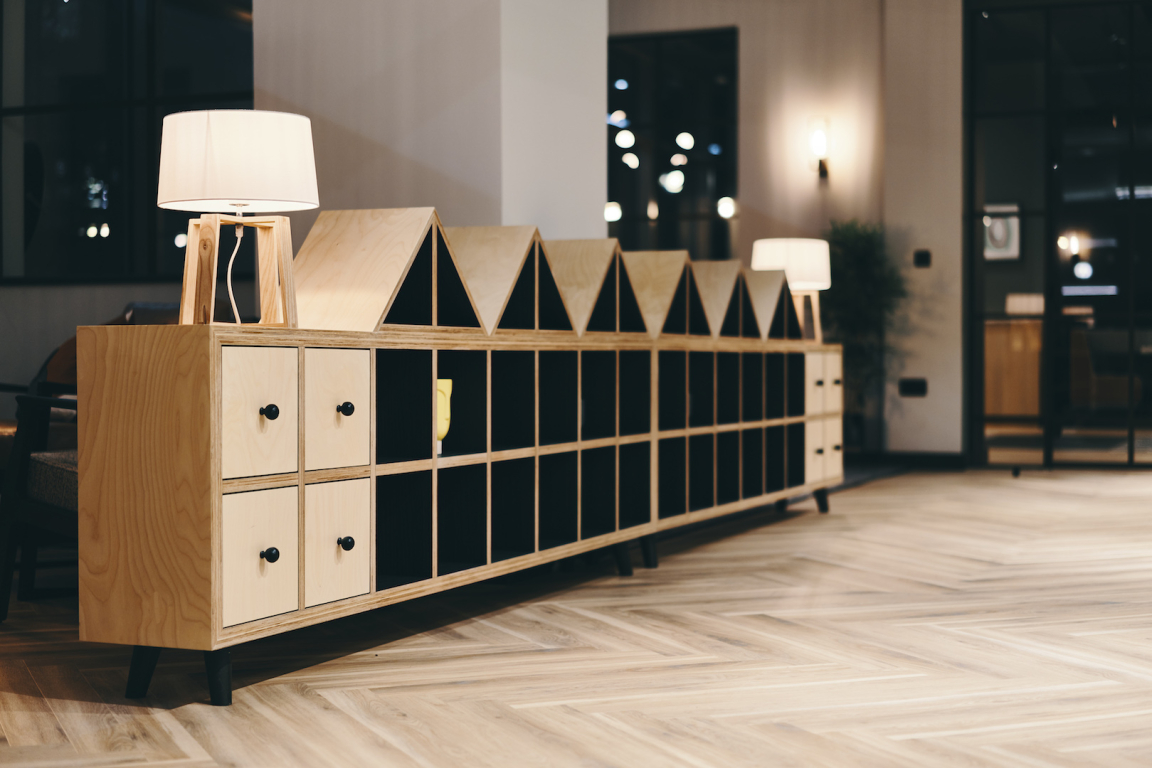
Symons House, Leeds - Bookcase designed by 74 and manufactured by Medlock. Photography by Gu Shi Yin
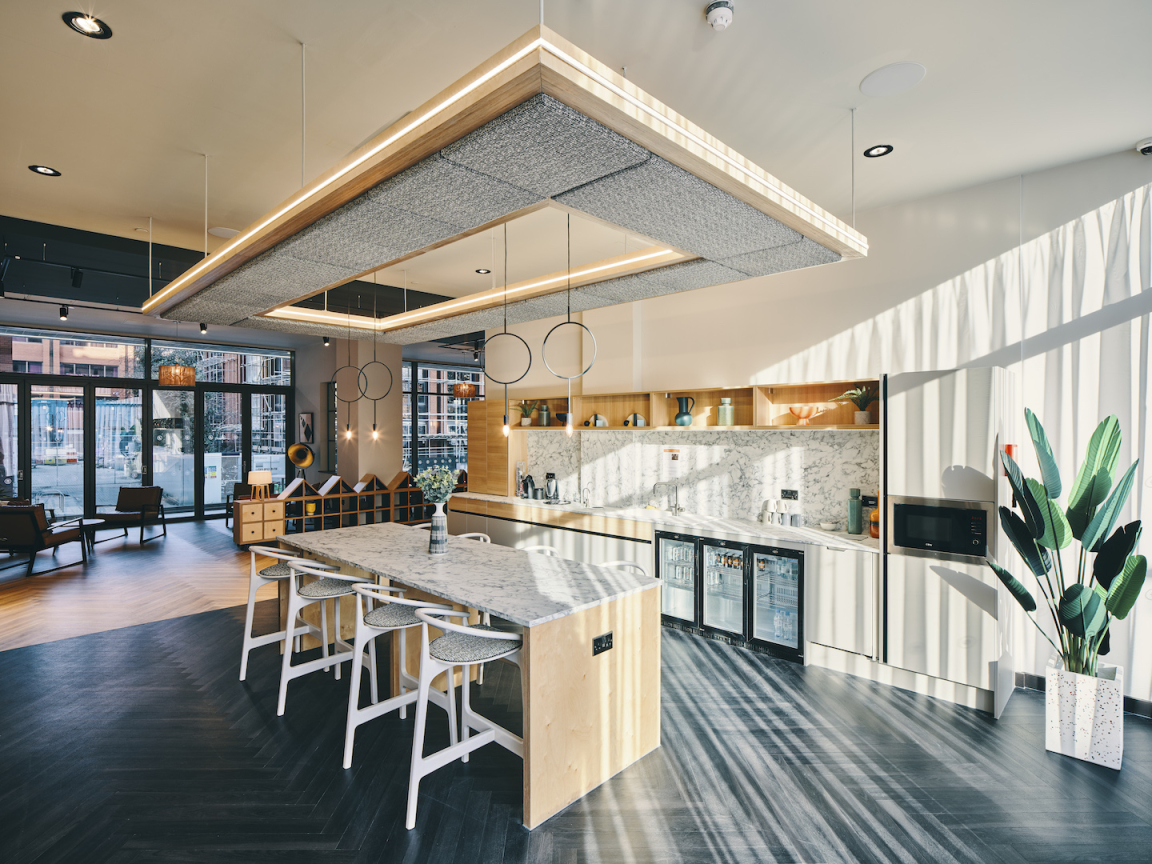
Symons House, Leeds - The communal kitchen, opposite the library area. Photography by Gu Shi Yin
The remainder of the scheme leads off left from reception, with a series of student postboxes first of all to the left of the circulation corridor sourced from the Safety Letterbox Company in a bronze finish to fit with the metallic theme. Directly opposite is the circulation void leading to the other floors. There is also additional seating in the postboxes area and a number of artworks, as well as the first part of external terracing to the front of the scheme, accessible via a fixed door.
Study rooms three and four come next on the left, with crittal-style fully-glazed internal walls and doors, and artwork to animate the space, as well as eye-catching feature lighting. The unisex washrooms on the scheme are opposite and are notably high-spec. Black tile-clad walls are set around a large space with a central feature sink area with round-edged mirrors attached to both the ceiling and the trough, plus large, bronze-edged wall mirrors.
The next space, along with on the left is a long, relaxed library area with loose furniture and bespoke bookshelf furniture, designed by 74 and made by Medlock, featuring laminate inside shelves and solid timber ends, and angled ‘roof’ sections to underline a homely feel playfully once more. The roof sections can also hold an open book.
Opposite the library space is two stand-out areas. First of all, a communal kitchen, bespoke-created for the scheme by kitchen specialists Gemini, and including a breakfast bar with a marble laminate top and white, elegant Cheshire High Stools from Telegraph Furniture. A rectangular ceiling raft over the breakfast bar features inset-LED lighting, as well as four pendant lights in an elegant circular loop design – the Circle light by Hannakaisa Pekkala. The flooring in this area is a dark grey version of the Amtico herringbone timber used elsewhere.
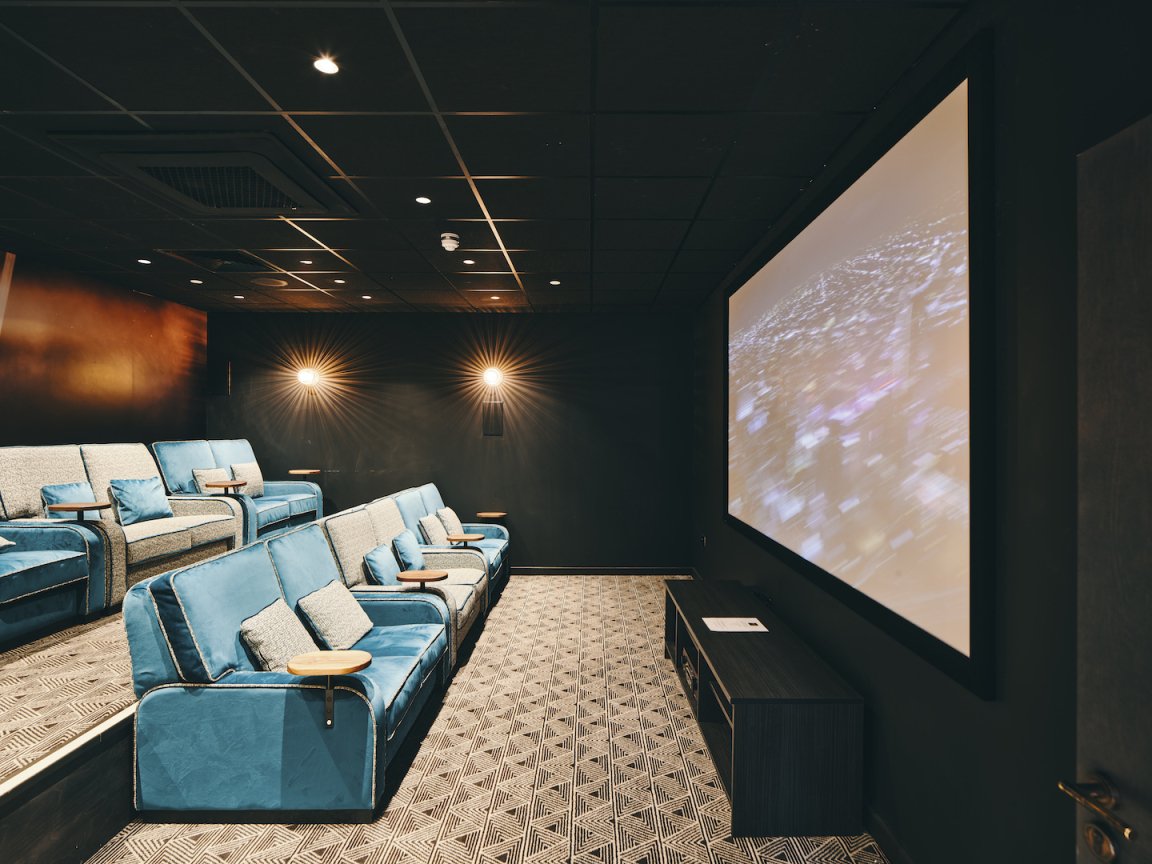
Symons House, Leeds - Ultra-luxe seating within the cinema room. Photography by Gu Shi Yin
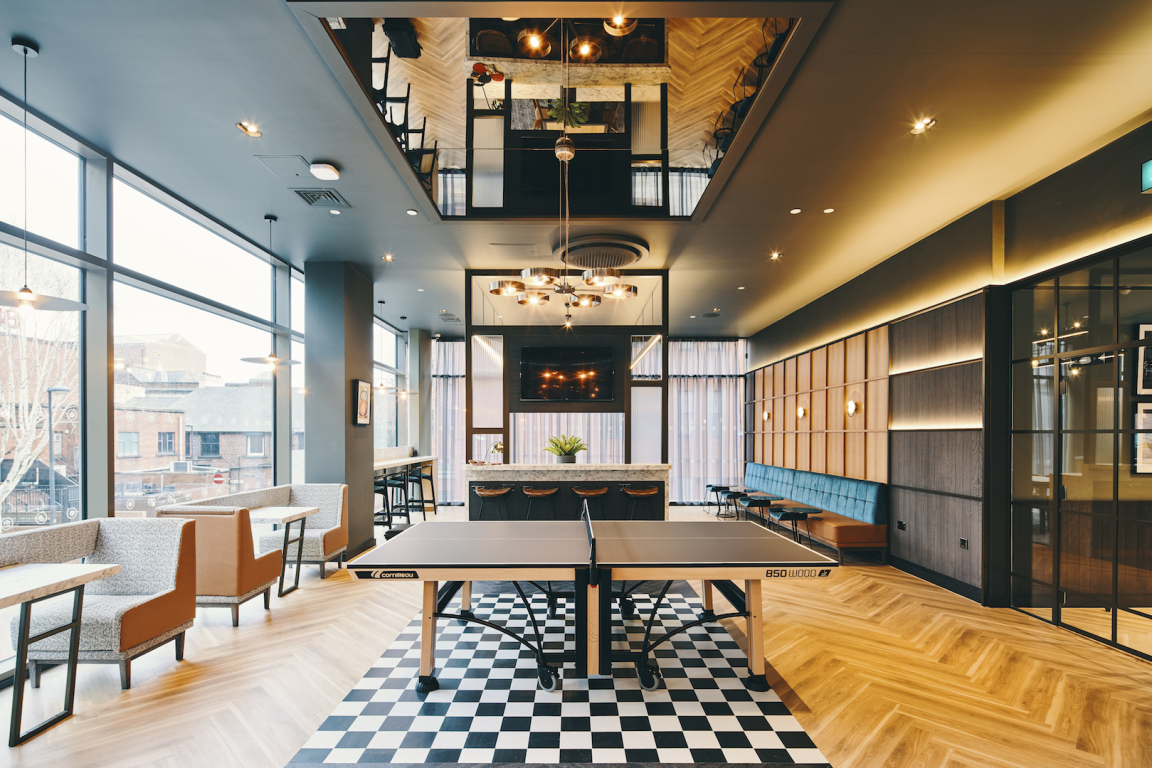
Symons House, Leeds - The central screen reaches from the dry bar to the ceiling. Photography by Gu Shi Yin
The second stand-out space is the scheme’s cinema room, which features the same, super-high-spec modular deep seating as used in Everyman Cinemas for a really plush, relaxed feel. The technology in the space is notably high-spec, too, including a top-of-the-range projector screen, recessed soundbars, and high-quality soundproofing.
The final ground floor space is the largest single, continuous space: a gaming lounge with pool and table tennis tables. Space is arranged around a central dry bar with fridges and a high-seating bench, plus a timber and glazing screen reaching from the bar to the ceiling raft above to punctuate the space at its mid-point feature lighting to either side – the Fossa chandelier by Mullan. Additional feature lights are made up of bronze squares with inset, bronze-tinted, mirrored ceiling tiles, including one directly over the pool table.
The central section of the space, where a long, social table, the games tables, and dry bar are located, have inset feature flooring in alternating sections of black-and-white chequerboard and the same dark grey timber used in the communal kitchen. Two sections of the inner wall of the games lounge feature banquette seating with a blue velvet seat backs set against timber wall panelling, with interspersed Orac wall lights.
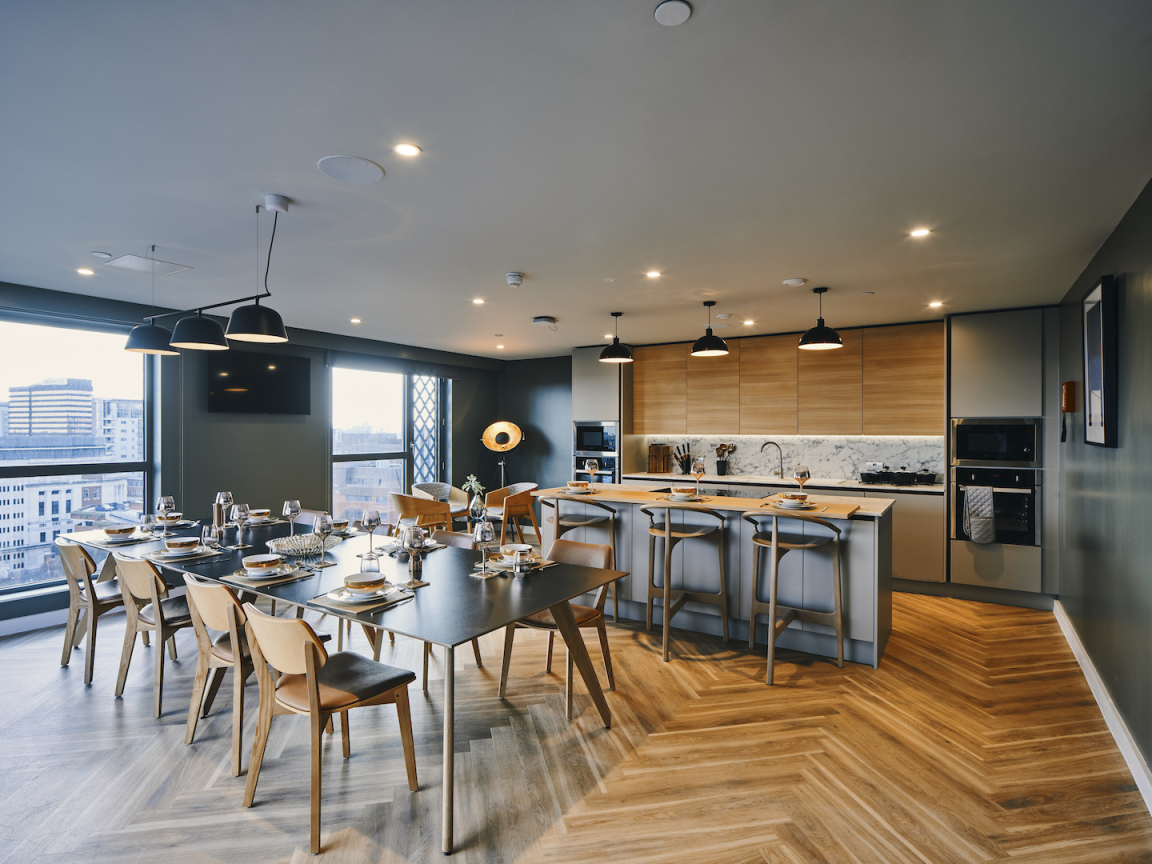
Symons House, Leeds - The private dining space includes built-in kitchen and island by Gemini. Photography by Gu Shi Yin
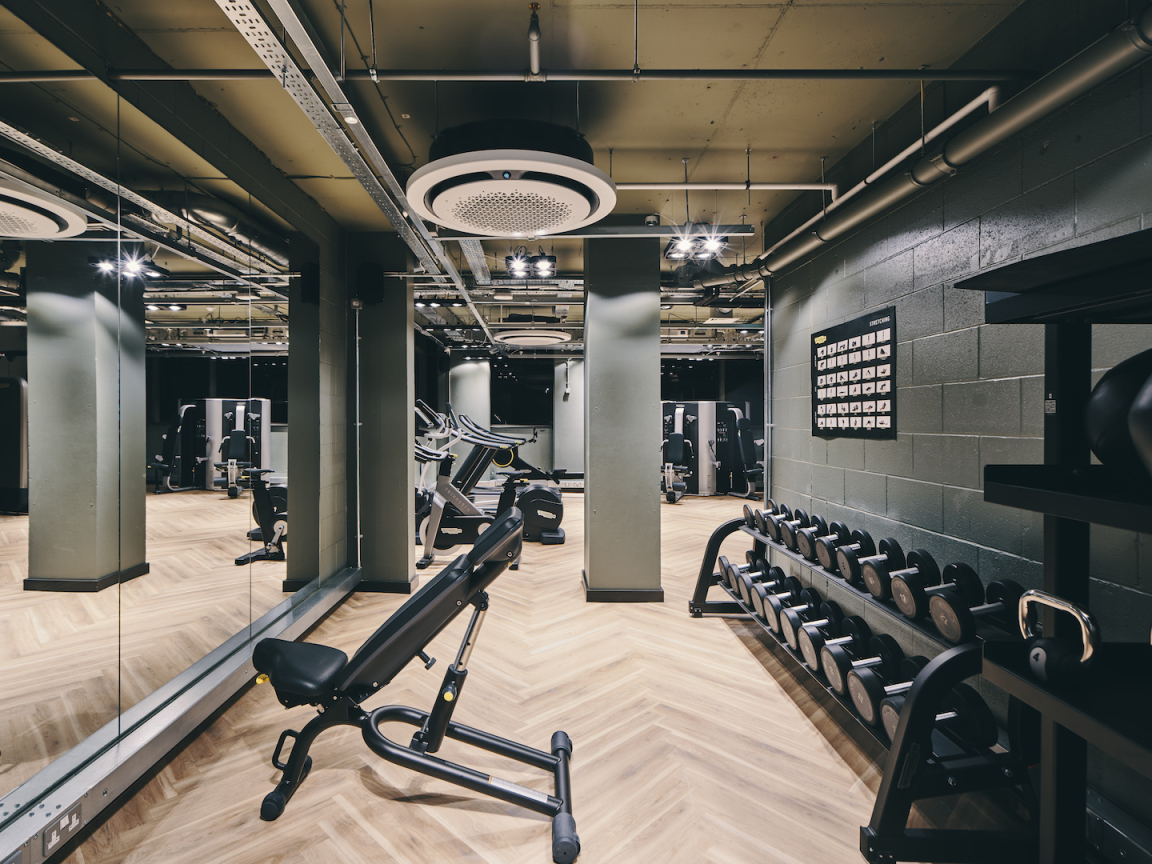
Symons House, Leeds - Lower-ground floor gym. Photography by Gu Shi Yin
Other seating areas opposite include two sets of high-bar seating along the glazed external wall, split by a central series of bespoke, conjoined lower-backed armchairs, designed for the project by 74, with continuous linking top sections and marble-laminate inset tables with angled-in legs. There are full-height voile curtains on the lounge’s back wall to allow for privacy due to the proximity of the next building.
The gym area on the lower-ground floor level also features super-sized graphics, designed by 74, in colourways that link to the rest of the scheme.
A final element of 74’s amenity-space design is the private dining room on the 8th floor that looks out over a roof terrace, designed by landscape architects re-form (also responsible for the ground-floor external terrace space).The space features a built-in kitchen and island by Gemini, as well an 8-person black-laminate-topped table with pendant lights overhead by Muuto and a loose furniture area.
Discover more about interior and architecture practice 74.



